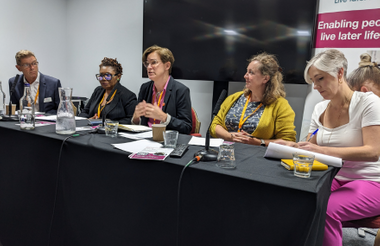Methodist Homes (MHA) has seen its energy costs more than triple in the last two years, its chief executive has revealed.
Sam Monaghan said that since Russian president Vladimir Putin invaded Ukraine in February 2022, his charity’s energy bills have increased from £5m to £18m and are likely to keep rising.
Monaghan was speaking yesterday during a fringe event on the future of care at the Liberal Democrat autumn conference in Bournemouth.
He also said that MHA still has a 24% turnover rate in its services despite the charity paying its more than 6,000 employees the real living wage and awarding them a 10% pay increase this year in response to inflationary pressures.
£18m spent on energy costs
Monaghan said that the care sector was “badly hit” during the pandemic, with the cost-of-living and energy crises adding to existing cost pressures.
“Since then, Putin has invaded Ukraine and our energy bills over the last two years have gone up from £5m to £18m, heading towards quadrupling that amount,” he said.
He added that the workforce crisis in the care sector “has meant that we’ve had to draw more on agency workers”, who “cost one and a half times the price of a normally employed member of staff”.
“So, you can see the sheer toll financially of this on the sector.”
24% turnover rate
Monaghan said that his charity currently employs more than 6,000 people across its services and has been committed to paying them the real living wage over the past four years.
“We, again this year, gave people a 10% pay increase recognising the impact of inflation. And yet, we still have a 24% turnover in our services. The national average in the care sector is 30%.
“So, you can only imagine the churn that that makes in terms of the continual efforts to recruit, train, retain people who are working across our sector, let alone, and more crucially, the impact that has on the consistency of care for the people that we’re providing care and support for.”
He also said that as a provider whose services are mostly rated good or outstanding by the Care Quality Commission, “that costs and we’ve got to keep and maintain those costs”.
Also speaking at the event, Abi Williams, a registered home manager at MHA, said that low pay, the lack of professional status for the social care workforce and the fact that it is seen as an “unskilled job” make a lot of people leave the sector.
“We’ve had feedback that the statutory expectation within the sector and the responsibility that comes through with the role does not necessarily reflect the financial compensation that comes with the role,” she said.
Local authorities are ‘heavily cash-strapped’
Monaghan said that there are some “heavily cash-strapped local authorities” across the country, which tend to pay less for their care services.
This, he said, could result in the voluntary sector withdrawing from these areas because “they just can’t balance the books”.
“We’re facing a real crisis in the gap between what local authorities are able to pay and what the true cost of care is. We’re all engaged with the current government’s cost of care exercise. Worst case scenario for things like nursing and dementia care, you’re talking about an £800 gap per week between what a local authority can pay and what it actually costs to ensure good quality care for those individuals.”
He added: “In terms of the current governmental responses, the problem is they will be too short term. They focus on short-term pots for discharge to try and alleviate the pressures in the health service and they’ve also focused on short-term […] incentivisation of workforce. That doesn’t work. We need a proper, full and committed settlement so that we can continue to pay workers. In that way, we will seek to attract them going forward.”
Related articles










